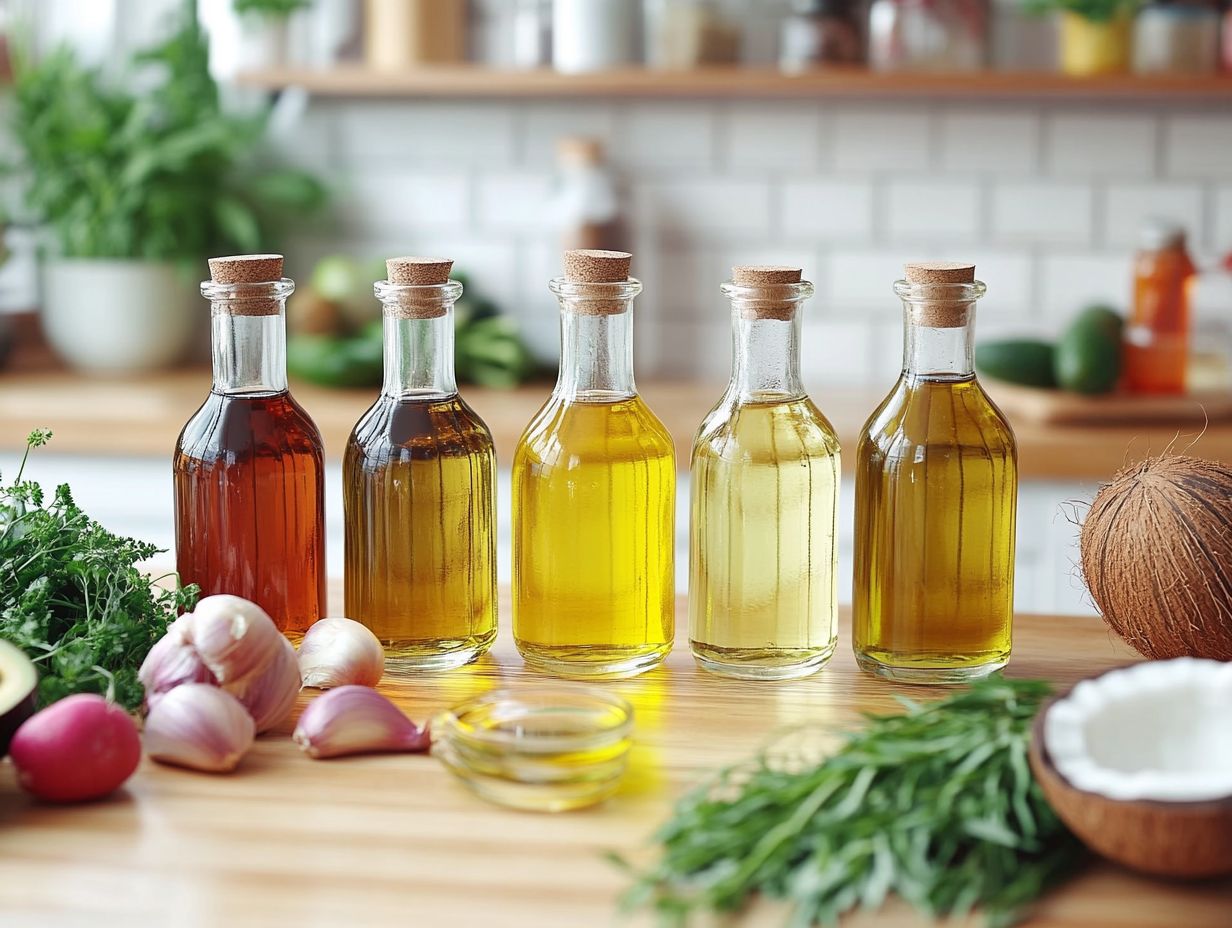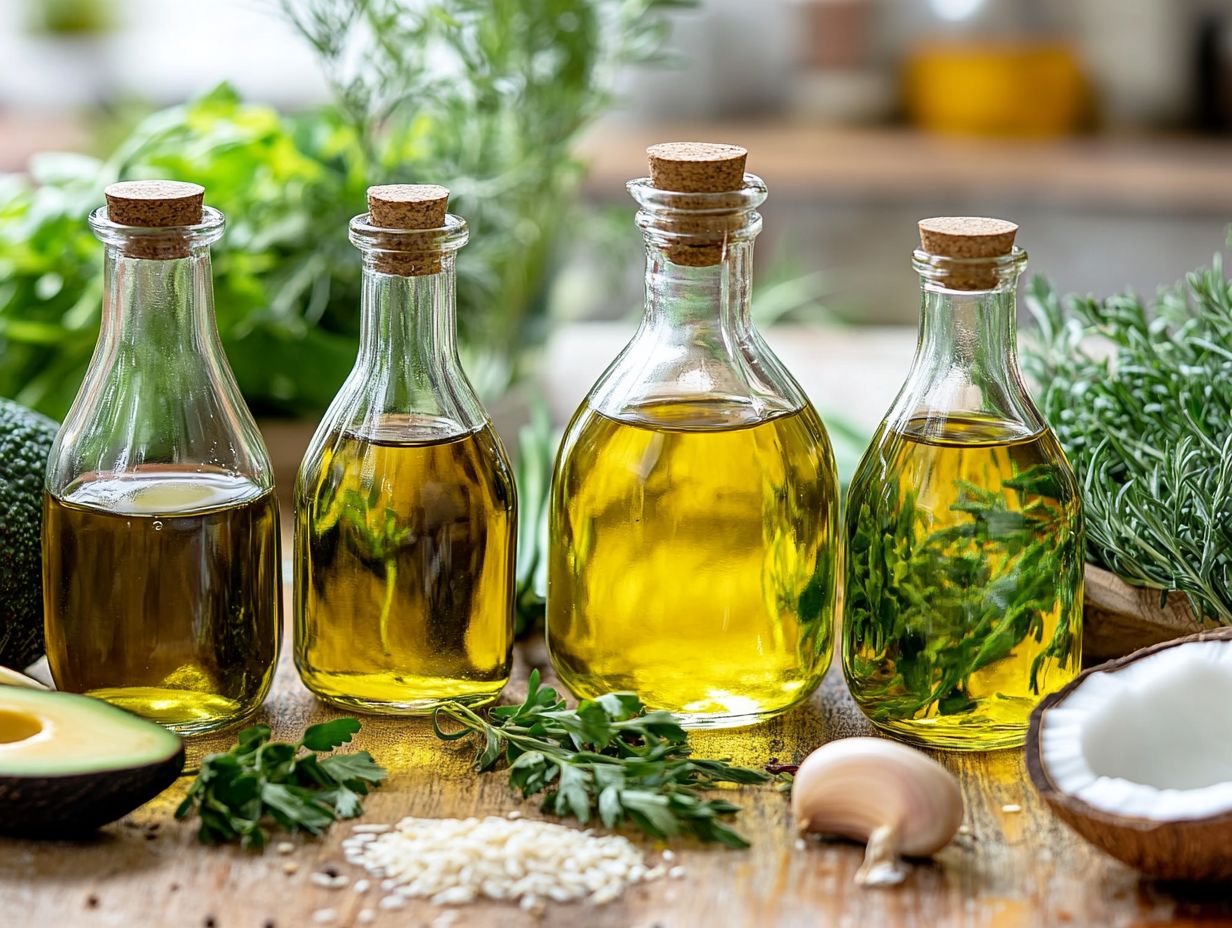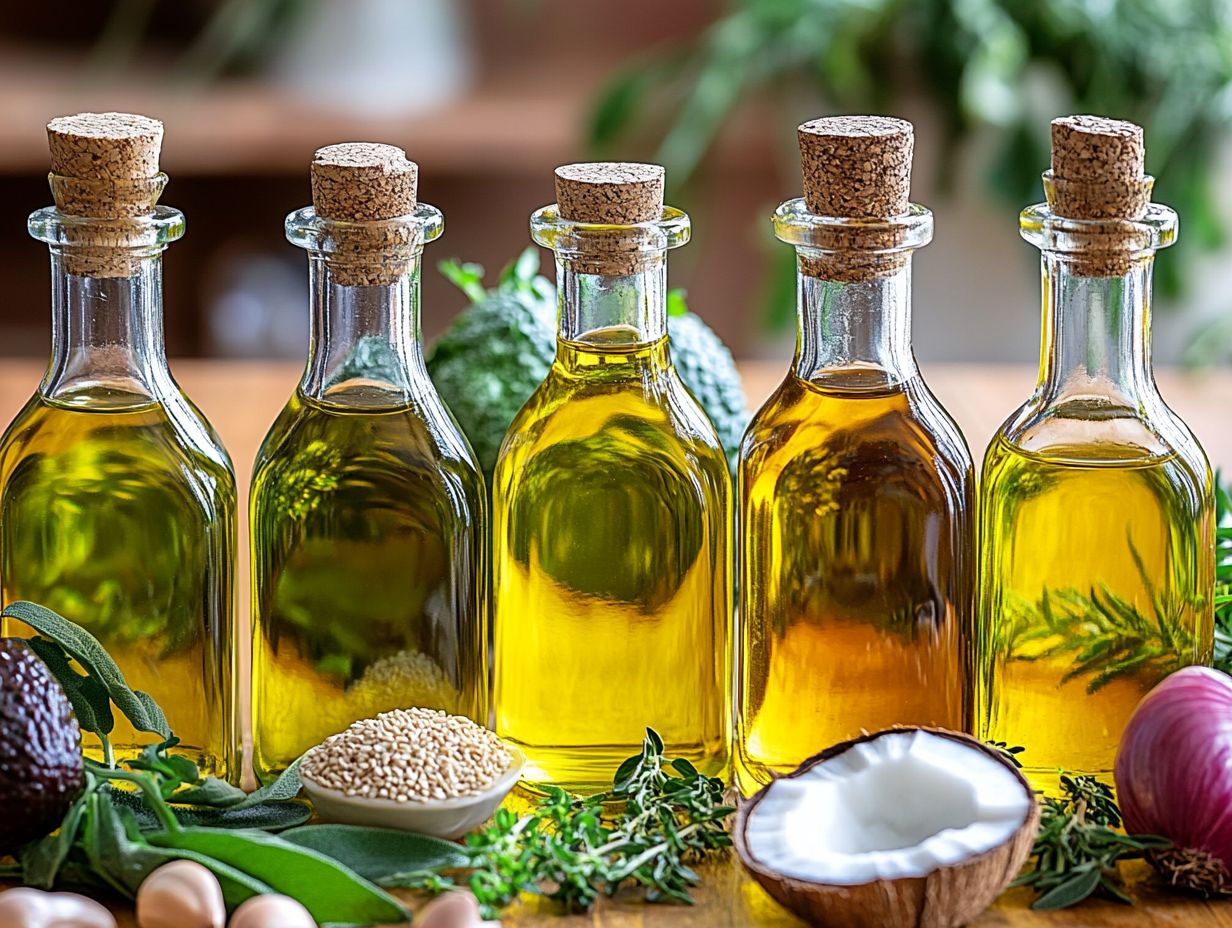Top 5 Cooking Oils and Their Health Benefits
Cooking oils are essential in your kitchen, serving not only to enhance flavor but also to offer significant health benefits.
From the heart-friendly benefits of olive oil to the versatility of coconut oil, each type has unique properties and advantages. You ll explore the top five cooking oils olive, coconut, avocado, canola, and flaxseed while uncovering their nutritional benefits, practical applications, and potential drawbacks.
Learn how to select the ideal oil for your culinary needs, elevating your meals with health-conscious choices.
Contents
- Key Takeaways:
- 1. Olive Oil: The Heart-Healthy Oil
- 2. Coconut Oil: The Versatile Oil
- 3. Avocado Oil: The Nutrient-Dense Oil
- 4. Canola Oil: The Low-Saturated Fat Oil
- 5. Flaxseed Oil: The Plant-Based Omega-3 Source
- What Are the Different Types of Cooking Oils?
- What Are the Health Benefits of Olive Oil?
- How Can Coconut Oil Be Used in Cooking?
- What Makes Avocado Oil a Healthy Choice?
- Is Canola Oil a Good Substitute for Other Oils?
- What Are the Benefits of Using Flaxseed Oil in Cooking?
- How Can You Incorporate These Oils into Your Diet?
- What Are the Potential Downsides of Using These Oils?
- Which Cooking Oil Is Best for Your Health?
- How Can You Choose the Right Cooking Oil for Your Needs?
- What Are Some Alternative Uses for These Oils?
- Frequently Asked Questions
- What are the top 5 cooking oils and their health benefits?
- What are the key differences between the top 5 cooking oils?
- Can these top 5 cooking oils be used for different types of cooking?
- Are these top 5 cooking oils safe for consumption?
- Can these top 5 cooking oils help with weight loss?
- Are there any potential risks or allergies associated with these top 5 cooking oils?
Key Takeaways:

- Olive oil is a heart-friendly oil that can lower the risk of heart disease and improve cholesterol levels.
- Coconut oil is a versatile oil that can be used for cooking, baking, and even skincare. It contains healthy fats and medium-chain triglycerides that can boost metabolism and provide energy.
- Avocado oil is a nutrient-dense oil that is rich in vitamins, minerals, and antioxidants. It can help improve skin and eye health and may even aid in weight loss.
1. Olive Oil: The Heart-Healthy Oil
Olive oil is hailed as one of the healthiest cooking oils, renowned for its heart-friendly properties derived from high levels of monounsaturated fats and antioxidants.
These beneficial compounds not only work to lower bad cholesterol levels but also promote overall cardiovascular health.
Nutrition expert Kerry Torrens highlights that olive oil is abundant in polyphenols, which play a crucial role in fighting inflammation and harmful effects in your body.
Among the various types of olive oils, extra virgin olive oil stands out for its minimal processing and higher concentration of beneficial nutrients compared to refined varieties.
The Mediterranean diet prominently features olive oil, emphasizing its versatility in everyday meals. Whether as a dressing, cooking oil, or condiment, it proves to be a great addition to your meals.
By incorporating this golden elixir into your diet, you can enjoy a tasty way to improve your heart health while reaping the many rewards of this ancient superfood.
2. Coconut Oil: The Versatile Oil
Coconut oil is a remarkably versatile ingredient that has surged in popularity lately, thanks to its distinctive fatty acid profile dominated by medium-chain triglycerides (MCTs).
This makes it a fantastic choice for frying and saut ing, imparting a subtle tropical flavor that beautifully enhances various cuisines.
In the realm of baking, you can effortlessly substitute it for butter or vegetable oils, yielding a moist texture while contributing to healthier recipes.
While the potential health benefits like improved digestion and boosted energy levels are certainly enticing, it’s wise to keep in mind its high saturated fat content, which can elevate LDL cholesterol (often referred to as ‘bad cholesterol’) levels if overindulged.
Coconut oil is unique compared to ghee and vegetable oils, standing out with its unique health properties and flavor profile, making it a favored choice among health-conscious cooks who appreciate its versatility.
3. Avocado Oil: The Nutrient-Dense Oil
Avocado oil truly stands out as one of the healthiest cooking oils available. It’s celebrated for its impressive high content of unsaturated fats and vitamin E, making it an incredibly nutrient-dense choice for those who prioritize their health.
Rich in monounsaturated fats, this oil supports your heart health by lowering bad cholesterol levels, significantly contributing to your overall well-being.
Its remarkable antioxidant properties work to combat oxidative stress, promoting vibrant skin and enhancing your immune function.
With a high smoke point of around 520 F, avocado oil is incredibly versatile. It’s perfect for frying, saut ing, and even as a dressing for salads offering benefits that some oils can t match when exposed to high temperatures.
When you compare it to olive oil, a staple in the Mediterranean diet, avocado oil not only provides similar health benefits but also brings a unique flavor profile to your dishes, enriching your balanced and nutritious lifestyle.
Start cooking with these oils today and enjoy their benefits!
4. Canola Oil: The Low-Saturated Fat Oil
Canola oil is often celebrated as a low-saturated fat option, making it an excellent choice for health-conscious individuals eager to cut back on saturated fats while enjoying versatile cooking possibilities.
Its impressive nutritional profile boasts a considerable amount of polyunsaturated fats, especially omega-3 and omega-6 fatty acids, which are good for your heart. These essential fats help lower cholesterol levels and reduce the overall risk of heart disease.
When you compare canola oil to other cooking oils like olive oil or coconut oil, it shines for its favorable fat composition and its ability to handle high-heat cooking methods like frying and baking. This is due to its higher smoke point, the temperature at which oil starts to smoke and break down. This versatility makes it a preferred choice for both home cooks and professional chefs seeking healthier cooking alternatives.
5. Flaxseed Oil: The Plant-Based Omega-3 Source
Flaxseed oil stands out as a remarkable plant-based source of omega-3 fatty acids, essential for maintaining heart health and reducing inflammation something that s increasingly vital in today’s diet.
With its impressive antioxidant content, flaxseed oil also supports skin health and combats oxidative stress. You can use this versatile oil in many ways: drizzle it over salads to enhance flavor or blend it into smoothies to boost your nutrient intake.
You must know the difference between refined and unrefined flaxseed oils. The unrefined version retains more nutrients, making it perfect for cold dishes. In contrast, the refined variant has a higher smoke point, making it suitable for light cooking.
Incorporating flaxseed oil into your daily regimen, whether through culinary applications or as a dietary supplement, can significantly boost your overall wellness.
What Are the Different Types of Cooking Oils?

Cooking oils come in a delightful variety, each with its unique properties and health implications. You have unrefined oils that retain their natural nutrients, while refined oils are processed for higher smoke points and longer shelf life. Understanding these distinctions is essential for making informed culinary choices.
For example, olive oil is celebrated for its heart-healthy fats and rich antioxidant profile, making it ideal for salad dressings and low-heat cooking. In contrast, avocado oil boasts a high smoke point and numerous nutrients, offering versatility for both saut ing and grilling.
Then there’s coconut oil, which brings a distinct flavor to the table. However, be cautious with its high saturated fat content, as excessive use could affect heart health. Ghee, a type of clarified butter, adds richness without the milk solids, making it a fantastic option for those with lactose intolerance. Meanwhile, vegetable oil, often the go-to for frying, can come from various sources, each with differing health implications.
By balancing these oils in your diet, you can maximize health benefits while minimizing potential risks.
What Are the Health Benefits of Olive Oil?
The health benefits of olive oil are well-documented and impressive. This golden elixir can enhance your heart health, reduce inflammation, and provide essential antioxidants that shield your body from chronic diseases.
Numerous studies have shown that incorporating this liquid gold into your daily diet, especially within the Mediterranean framework, can yield remarkable improvements in cardiovascular health. Research reveals that the heart-friendly monounsaturated fats in olive oil can lower bad cholesterol levels, significantly decreasing your risk of heart disease. Its anti-inflammatory properties may be pivotal in battling conditions like arthritis and other inflammatory disorders, while its abundant antioxidants work tirelessly to neutralize harmful free radicals in your body.
These qualities highlight the significance of olive oil, not merely as a culinary staple but as a formidable ally in your journey toward optimal health.
How Can Coconut Oil Be Used in Cooking?
Discover the magic of coconut oil in your cooking! This versatile oil can be used for frying, baking, and more, adding a unique flavor to your dishes.
Coconut oil has a high smoke point, making it perfect for high-heat cooking methods like saut ing and stir-frying. Unlike other oils, it retains its beneficial properties and adds a tropical twist to curries, marinades, and desserts.
This oil enhances both savory and sweet recipes. It s a fantastic substitute that will spark your culinary creativity, whether you are an experienced chef or a home cook eager to try something new.
What Makes Avocado Oil a Healthy Choice?
Avocado oil is an excellent option for healthier cooking. Its abundance of unsaturated fats helps your body absorb nutrients and promotes overall well-being.
This oil stands out because of its high content of heart-healthy monounsaturated fats. It not only adds flavor but also helps absorb essential fat-soluble vitamins like A, D, E, and K, which dissolve in fats and are stored in the body.
With a higher smoke point than many oils, avocado oil is versatile. Use it for frying, saut ing, or drizzling over salads for a delicious touch.
Is Canola Oil a Good Substitute for Other Oils?
Canola oil is a great substitute for other cooking oils. Its low-saturated fat content and heart-healthy properties make it a kitchen staple.
This oil s neutral flavor allows your ingredients to shine. It enhances dishes without overpowering them, making it a versatile option in many recipes.
Canola oil is rich in omega-3 and omega-6 fatty acids. Compared to olive or coconut oil, it has a higher smoke point, making it suitable for frying and baking.
What Are the Benefits of Using Flaxseed Oil in Cooking?
Flaxseed oil offers numerous health benefits. It’s rich in omega-3 fatty acids and antioxidants that promote heart health and overall wellness.
These components help reduce inflammation and lower cholesterol, vital for a healthy heart. Use flaxseed oil in salad dressings or as a finishing oil for cooked vegetables to enhance your meals.
Keep it at low temperatures to preserve its nutrients. Drizzle it over roasted vegetables or mix it into smoothies for added flavor and health benefits.
Incorporating flaxseed oil into your diet can significantly improve your health journey.
How Can You Incorporate These Oils into Your Diet?

Incorporating healthy cooking oils into your diet is essential for obtaining beneficial dietary fats and enhancing flavors. These oils also support nutrient absorption in your meals.
Using oils thoughtfully can elevate the taste and nutritional profile of your dishes. For example, olive oil makes a delightful base for homemade salad dressings. Avocado oil is perfect for high-heat cooking. When baking, try substituting traditional fats with coconut or flaxseed oil to boost your omega-3 intake.
Balancing fats in your diet is crucial. Combining different oils diversifies flavors and maximizes the range of nutrients absorbed, making meals more satisfying and healthful.
What Are the Potential Downsides of Using These Oils?
While cooking oils provide essential nutrients and enhance flavor, be aware of the potential downsides. Some oils contain high levels of saturated fat, and consuming refined oils can pose risks.
Refined oils may contribute to health concerns, including elevated cholesterol levels and an increased risk of heart disease. The refining process often strips away vital nutrients and introduces harmful compounds. It’s crucial to be mindful of the oils you choose.
Understanding the importance of moderation is key. Opting for healthier alternatives, like extra virgin olive oil or avocado oil, can elevate your dishes without compromising your health.
Make informed choices to enjoy the benefits of oils while minimizing risks.
Which Cooking Oil Is Best for Your Health?
Choosing the best cooking oil for your health involves evaluating factors such as types of fats, health benefits, and how each option fits your dietary needs.
With many choices available, understanding the differences can impact your cooking and long-term wellness. Oils like olive and avocado are celebrated for their heart-healthy monounsaturated fats, promoting good cholesterol levels and potentially reducing heart disease risk.
On the other hand, oils like canola and sunflower have a neutral flavor, making them great for frying and baking. They are rich in polyunsaturated fats, which are beneficial when consumed in moderation.
Your choice of oil affects both the flavor of your dishes and your overall health. Tailor your selections based on specific cooking methods and nutritional goals.
How Can You Choose the Right Cooking Oil for Your Needs?
Choosing the right cooking oil requires understanding the various options, their health benefits, and how they fit your dietary preferences.
With a variety of choices from olive and coconut to sesame and avocado oil consider factors like smoke points. These dictate how well an oil performs at different temperatures. For frying, select oils with higher smoke points; for lower temperatures, choose oils that offer unique flavors and healthful properties.
Be mindful of potential dietary restrictions; watch for allergens like nuts in certain oils. Customize your oil selections to suit your lifestyle choices whether it be veganism or heart-healthy eating. This can enhance not just the flavor of your meals, but also their nutritional value.
Don’t miss out on the amazing benefits of healthy cooking oils explore the best options today!
What Are Some Alternative Uses for These Oils?
Beyond the realm of traditional cooking, you ll discover that many oils possess alternative uses that can enhance your health and well-being. From skincare to dietary supplements, their remarkable versatility is truly impressive.
These oils, often brimming with healthy fats and antioxidants, promote hydration and elasticity in your skin and soothe various conditions. In hair care, certain oils can nourish and strengthen your strands, reducing breakage and adding a lustrous shine.
Adding specific oils to your diet improves how your body uses nutrients. They also offer anti-inflammatory benefits, making them valuable allies in your pursuit of a balanced lifestyle. By embracing these many uses, you can harness the full potential of oils for beauty and wellness.
Frequently Asked Questions
What are the top 5 cooking oils and their health benefits?

The top 5 cooking oils and their health benefits are:
- Olive oil: Known for its high levels of monounsaturated fatty acids, which have been linked to reducing the risk of heart disease.
- Avocado oil: Rich in oleic acid, a monounsaturated omega-9 fatty acid that can help lower cholesterol and improve heart health.
- Coconut oil: Contains lauric acid, a saturated fat that may increase the levels of good cholesterol in the body.
- Canola oil: Rich in omega-3 fatty acids, which have been shown to improve heart health and lower the risk of chronic diseases.
- Sunflower oil: High in vitamin E and other antioxidants, which can help protect the body against free radicals and reduce inflammation.
What are the key differences between the top 5 cooking oils?
The top 5 cooking oils have different nutritional profiles and properties that make them unique. For example:
- Olive oil is known for its high levels of monounsaturated fatty acids, while avocado oil is rich in oleic acid.
- Coconut oil is a saturated fat, unlike the other oils on this list, and contains lauric acid.
- Canola oil is a good source of omega-3 fatty acids, while sunflower oil is high in vitamin E and other antioxidants.
Can these top 5 cooking oils be used for different types of cooking?
Yes, these oils can be used for various types of cooking. Olive oil, avocado oil, and coconut oil are great for saut ing, frying, and baking. Canola oil is a good all-purpose oil for frying, baking, and making dressings. Sunflower oil is best for baking and making dressings due to its neutral flavor.
Are these top 5 cooking oils safe for consumption?
Yes, these oils are generally safe for consumption when used in moderation. It s important to remember that all oils, even the healthier ones, are high in calories and should be used sparingly as part of a balanced diet.
Can these top 5 cooking oils help with weight loss?
Some studies suggest that incorporating these top 5 cooking oils into a healthy diet may aid in weight loss. For example, olive oil and avocado oil have been linked to increased feelings of fullness, while canola oil and sunflower oil are lower in calories compared to other oils.
Are there any potential risks or allergies associated with these top 5 cooking oils?
While these oils are generally safe for consumption, some people may have allergies or sensitivities to certain oils. For example, those with nut allergies should avoid using avocado oil, as it is derived from avocados. It s always best to consult with a doctor or nutritionist before making any significant changes to your diet.




